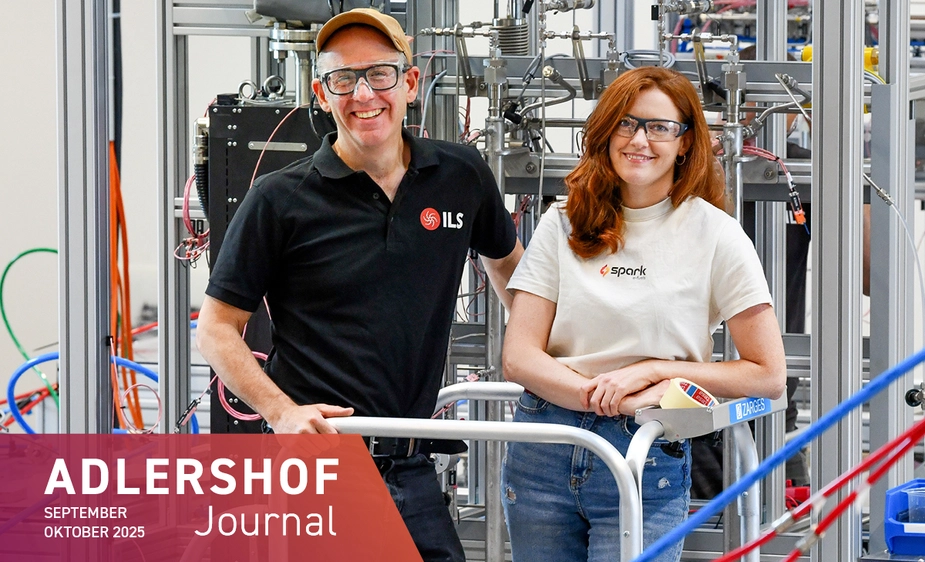Energy from CO₂
A spark is ignited for the future of fuels
Carbon dioxide is often only ever viewed as a greenhouse gas. However, it can also be an important raw material. The startup Spark e-Fuels hopes to use it to produce synthetic fuels, known as e-fuels. But there is a major hurdle that still needs to be overcome: the CO₂ molecule is extremely stable and can only be broken down with a high amount of energy. Nevertheless, this can be done in a climate-friendly way, as when the sun and wind generate more energy than is consumed, the surplus can be used for fuel production.
“Previous processes are designed for continuous operation and cannot cope with such fluctuations,” explains Spark co-founder Julia Bauer. “Our process is flexible enough to adapt to the availability of renewable energy – and it actually uses less energy than conventional methods.”
This would significantly reduce production costs – a crucial factor in making e-fuels economically competitive. The main target application is aviation, which relies on fuels with a higher energy density.
The idea originated in Arno Zimmermann’s doctoral thesis at the Technical University of Berlin (TU Berlin). He researched a chemical process which can work directly with renewable energies using batteries, removing the need for large intermediate storage facilities. The concept for Spark e-Fuels was developed together with Mathias Bösl, who worked as a consultant for green technologies. Bauer, a trained chemical engineer, was working as a project engineer in industry at the time. “It was an exciting job with big projects, but it was difficult to get your own ideas accepted in a large corporation – long-term strategies often determined what type of research was actually conducted,” she recalls, reflecting on the moment when her two co-founders first approached her. It was the idea of building a new technology from scratch which led her to make the move to the startup. “Being able to develop new processes, from the initial concept to implementation, without corporate constraints was very appealing to me.”
The initial laboratory tests at TU Berlin were so successful that the SPRIN-D team brought the German Federal Agency for Breakthrough Innovation on board. This was then followed by a validation study, further research projects, and a successful round of financing with Climate Venture Capital and Berlin-based investors in early 2025.
Constructing a pilot plant is the next milestone to be reached. Spark e-Fuels has awarded the contract to Integrated Lab Solutions (ILS) of Adlershof, an experienced specialist in customised research and development facilities. “We already knew each other from previous projects, and the technical possibilities in Adlershof were a perfect fit for our requirements,” says Anton Nagy, Managing Director of ILS. “In Adlershof, with the support of WISTA, we were able to set up special laboratories that meet the high safety standards required for operating our facilities with real chemicals.” Having the chance to work with combustible and sometimes toxic gases and liquids is a location advantage that is hard to find in Berlin. Another benefit for Spark e-Fuels is that everyone involved in the project is working in close proximity – short distances save time and make coordination easier.
This next step is technically challenging, as the switch from quartz glass construction in the lab to stainless steel reactors on a pilot plant scale changes flow behaviour, pressure conditions, and material requirements. “We are expecting effects that we will only see for the first time on this scale,” says Bauer. The pilot plant is scheduled to enter operation at the beginning of 2026 as a springboard to the next stage of expansion – an industrial demonstration plant. The most ambitious goal of all is to have the first commercial plant up and running in 2029.
The timing is right. EU quotas for sustainable aviation fuels have been outlined, but production capacities are lacking. “Many people talk about green hydrogen or CO₂ capture, but few are putting it into practice in synthesis gas and e-fuels,” says Nagy. Spark e-Fuels hopes to close this gap and turn a greenhouse gas into a valuable energy source.
Kai Dürfeld for Adlershof Journal
